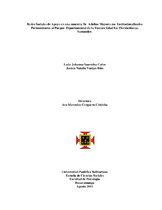| dc.contributor.advisor | Cerquera Córdoba, Ara Mercedes | |
| dc.contributor.author | Saavedra Calvo, Lady Johana | |
| dc.contributor.author | Vargas Ríos, Jessica Natalia | |
| dc.coverage.spatial | Seccional Bucaramanga. Universidad Pontificia Bolivariana. Escuela de Ciencias Sociales. Facultad de Psicología | spa |
| dc.coverage.temporal | 2011 | |
| dc.date.accessioned | 2014-09-09T20:07:02Z | |
| dc.date.available | 2014-09-09T20:07:02Z | |
| dc.date.created | 2011-09-08 | |
| dc.date.issued | 2014-09-09 | |
| dc.identifier.uri | http://hdl.handle.net/20.500.11912/1646 | |
| dc.description | 72p.: (pdf); anexos; tablas | spa |
| dc.description.abstract | Algunos autores definen las redes sociales de apoyo como aquellos lazos entre los individuos y grupos que permiten promover el dominio emocional, ofrecer consejo y proporcionar feedback sobre la propia identidad y el desempeño. La presencia de una red social para el anciano no solo se relaciona con la buena salud mental, sino que también actúa como un mecanismo protector frente a enfermedades reduciendo sus efectos, además de reafirma los sentimientos de valor personal y autoestima. El objetivo del presente estudio es identificar los recursos sociales de apoyo en una muestra probabilística de 330 adultos mayores -mujeres y hombres- los cuales pertenecían al parque departamental de la tercera edad de Floridablanca, Santander a la que se le administró examen mental Minimental de Lobo, Ezquerra, Gómez, Sala, y Seva Díaz, (1978) en donde no se evidenció deterioro cognitivo en los adultos seleccionados, posterior a esto se les aplicó el Cuestionario MOS de Sherboune y Steward (1991) el cual se trabajó con los baremos de validación de Argentina en donde se tiene una fiabilidad de 0.97; dicho cuestionario explora diferentes tipos de apoyo social como: apoyo emocional, apoyo material, redes sociales y apoyo afectivo. El análisis de los resultados se realizó en el programa estadístico SPSS en donde se halló que el 34% de los adultos mayores reciben un apoyo emocional, el 14% posee un apoyo material, otro 16% en sus relaciones sociales y por último un 12% un apoyo afectivo. En conclusión se puede observar que los adultos mayores de la muestra reciben más apoyo emocional que contribuye a la conformación de una red social amplia y distinguida. | spa |
| dc.description.abstract | Some authors define the social networks of support as those bows between the individuals and groups that allow to promote the emotional domain, to offer advice and to provide feedback on the own identity and the performance. The presence of social resources and of social networks for the not alone elder relates to the good mental health, but also it acts as a protective mechanism opposite to diseases reducing his effects, beside reaffirming the feelings of personal value and he autoestimates. The aim of the present study is to identify the social resources of support in a sample probabilística of 330 major adults - women and men - which concerned to the departmental park of Floridablanca's third age, Santander to the one that managed the affairs mental examination Lobo, Ezquerra, Gómez, Sala, and Seva Díaz (1978) where no evidence of cognitive impairment in selected adults, subsequent to this questionnaire were administered the MOS Sherboune and Stewart (1991) which worked with the scales validation Argentina where he has a reliability of 0.97 , the questionnaire explores different types of social support: emotional support, material support, social networking and emotional support. Analysis of the results was performed in SPSS where they found that 34% of older adults receive emotional support, 14% have a material support, another 16% in social relationships, and finally 12% emotional support. In conclusion we can see that the elderly in the sample receive more emotional support that contributes to the formation of a broad social network and distinguished. | |
| dc.language.iso | es | |
| dc.publisher | Universidad Pontificia Bolivariana | spa |
| dc.rights | Attribution-NonCommercial-NoDerivatives 4.0 International | * |
| dc.rights.uri | http://creativecommons.org/licenses/by-nc-nd/4.0/ | * |
| dc.subject | Psicología | spa |
| dc.subject | Ancianos | spa |
| dc.subject | Vejez | spa |
| dc.subject | Floridablanca (Santander, Colombia) | spa |
| dc.subject | Asistencia económica | spa |
| dc.subject | beneficencia | spa |
| dc.subject | Tesis y disertaciones académicas | spa |
| dc.title | Redes sociales de apoyo en una muestra de adultos mayores no institucionalizados pertenecientes al parque departamental de la tercera edad en Floridablanca, Santander | spa |
| dc.type | bacherlorThesis | spa |
| dc.rights.accessRights | openAccess | spa |
| dc.type.hasVersion | publishedVersion | spa |
| dc.identifier.instname | instname:Universidad Pontificia Bolivariana | spa |
| dc.identifier.reponame | reponame:Repositorio Institucional de la Universidad Pontificia Bolivariana | spa |
| dc.identifier.repourl | repourl:https://repository.unab.edu.co/ | |


